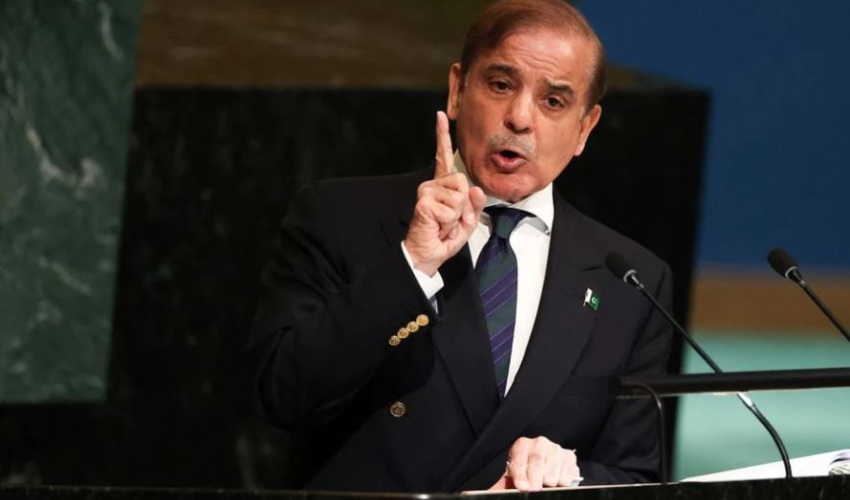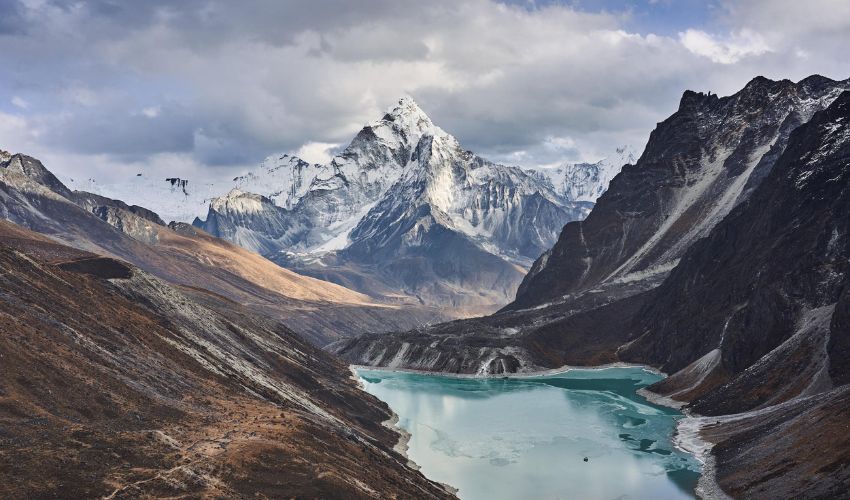Prime Minister Shehbaz Sharif is delivering a powerful speech at the United Nations General Assembly (UNGA), urging the international community to take decisive action against Israeli aggression in Gaza.
He began his address by reciting verses from the Holy Quran, setting the tone for a call to justice and peace in the Middle East.
Palestinian conflict
Sharif condemned the ongoing violence in Gaza, describing it as a “great tragedy” where Palestinian children are being buried alive, and their homes are being burned. “The world is watching this cruelty unfold,” he said, emphasizing that mere condemnation is not enough. He called for immediate global intervention to halt Israel's attacks.
The prime minister strongly advocated for a two-state solution to resolve the Palestinian conflict, stating that it is the only way to end the suffering in Gaza. He urged the UN to grant Palestine the status of a permanent member, arguing that this would contribute to lasting peace in the region.
In addition to the situation in Gaza, Sharif expressed grave concern over Israel's recent aggression in Lebanon, warning that the violence could escalate into a broader regional conflict. "The threat of a major war in the region is growing," he cautioned.
Indian-occupied Jammu and Kashmir
Turning his attention to South Asia, the Prime Minister highlighted the ongoing human rights violations in Indian-occupied Jammu and Kashmir. He called on the international community to focus on the humanitarian crisis in the region, where, he said, the Indian Army continues to commit atrocities against the Kashmiri people.
“Illegal occupation creates a fresh hell, every day, in the killing fields of Palestine, and in occupied Jammu and Kashmir… Can we turn a blind eye to the mothers, cradling the lifeless bodies of their children? This is not just a conflict; this is systematic slaughter of innocent people; an assault on the very essence of human life and dignity. The blood of Gaza’s children stains the hands of not just the oppressors, but also of those who are complicit in prolonging this cruel conflict,” the prime minister told the annual 79th Session of the United Nations General Assembly (UNGA).
“Since 5 August 2019, India has initiated unilateral illegal steps to impose what its leaders ominously call, a “Final Solution” for Jammu and Kashmir. 900,000 Indian troops terrorize the people of occupied Jammu and Kashmir, with draconian measures, including prolonged curfews, extra-judicial killings and the abduction of thousands of young Kashmiris.”
He highlighted the Indian nefarious designs of seizing Kashmiri lands and properties, and settling outsiders into occupied Jammu and Kashmir, to transform the Muslim-majority into a minority.
Apprising the global leaders of India’s massive expansion of its military capabilities, he said its war doctrines, envisaged a surprise attack and a “limited war under the nuclear overhang”. Thoughtlessly, India has spurned Pakistan’s proposals, for a mutual “Strategic Restraint Regime”. Its leadership has often threatened to cross the Line of Control and “take-over” Azad Kashmir,” he added.
“Let me state, in no uncertain terms that Pakistan will respond, most decisively, to any Indian aggression,” he remarked.
Climate change
Deliberating upon the challenge posed by climate change, Shehbaz Sharif recalled that the catastrophic floods devastated Pakistan two years ago, causing damage of thirty billion dollars.
He pointed out that Pakistan emits less than one percent of global carbon emissions, yet we have paid a heavy price for no fault of ours. He said we must uphold the maxim and the polluter must pay.
The Prime Minister said Pakistan looks forward to the fulfillment of commitments made by development partners to support the achievements of Sustainable Development Goals and climate goals including a new annual goal beyond one hundred billion dollars in climate finance.
“This is unfair in any calculus of global justice. We must uphold the axiom: the polluter must pay,” he remarked and called for the fulfillment of commitments made by the developed countries in climate financing to support the achievements of the SDGs and climate goals.
Calling the debt burden on nearly 100 countries a “death trap” impacting their ability to meet the SDGs, he emphasised reforming and aligning the world trade and technology regimes to promote development and global equity.
Economy
PM Sharif acknowledged the difficult decisions taken to restore the economy, which, although caused temporary hardships for the people, have started to bear fruit. He noted that inflation has decreased to a single digit, a significant achievement considering the country's economic situation.
The premier also expressed optimism about the China-Pakistan Economic Corridor (CPEC), stating it will usher in a new era of development for Pakistan. CPEC is expected to boost economic growth, create jobs, and improve infrastructure.
Terrorism
Turning to national security, PM Sharif emphasized that Pakistan has been battling terrorism for decades, resulting in the loss of over 80,000 civilians and soldiers. He specifically mentioned the heartbreaking massacre of children at the Army Public School (APS).
To combat terrorism, PM Sharif stressed the need for the Afghan government to take decisive action against terrorist groups and prevent cross-border terrorism. He also called for action against other terrorist organizations, including Fitna al-Khawarij.
“Make no mistake, we are determined to eliminate this threat once again, through our comprehensive national effort, “Azm-e-Istehkam” (Resolve to Promote Stability). And, we will work collectively with the international community to combat all forms of terrorism and reform the global counter-terrorism architecture,” he reaffirmed.
On the international front, PM Sharif reiterated Pakistan's commitment to a peaceful resolution of the Ukraine war. Pakistan has maintained a neutral stance, supporting Ukraine's sovereignty while avoiding criticism of Russia.
Afghanistan
Coming to Afghanistan, the prime minister said Pakistan desired the earliest possible normalization of the situation in Afghanistan and joined the UN’s appeal for $3 billion in humanitarian assistance for the Afghan people.
He urged the Afghan Interim Government to meet international expectations to respect human rights, including the rights of women and girls, promote political inclusion, and take effective action to neutralize all terrorist groups within Afghanistan, especially those responsible for cross-border terrorism against neighbouring countries. These include ISIL-K (Daesh), the Al-Qaeda-affiliated TTP/Fitna al-Khawarij, Majeed Brigade, BLA and others.


























